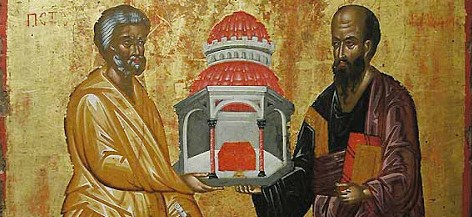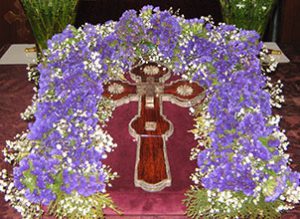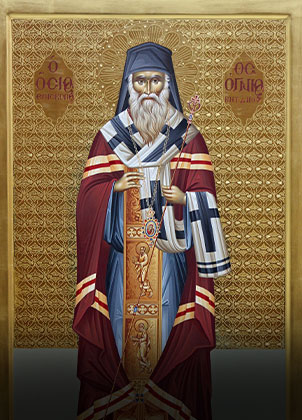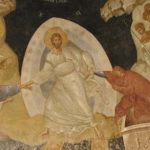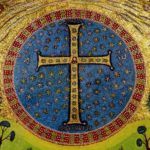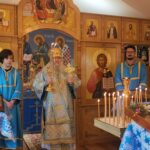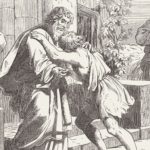APOSTLES PETER and PAUL
Compiled by Seraphim Larin
Among all of Christ’s Apostles, the most outstanding in disseminating Christ’s Teachings throughout the many nations were Peter and Paul. Our Holy Church calls them holy foremost-of-the-Apostles because they not only laboured more than all the others in preaching the Christian faith, but for their extraordinary zeal and passionate evangelism, which converted untold thousands of heathens to the Christian Faith in many countries.
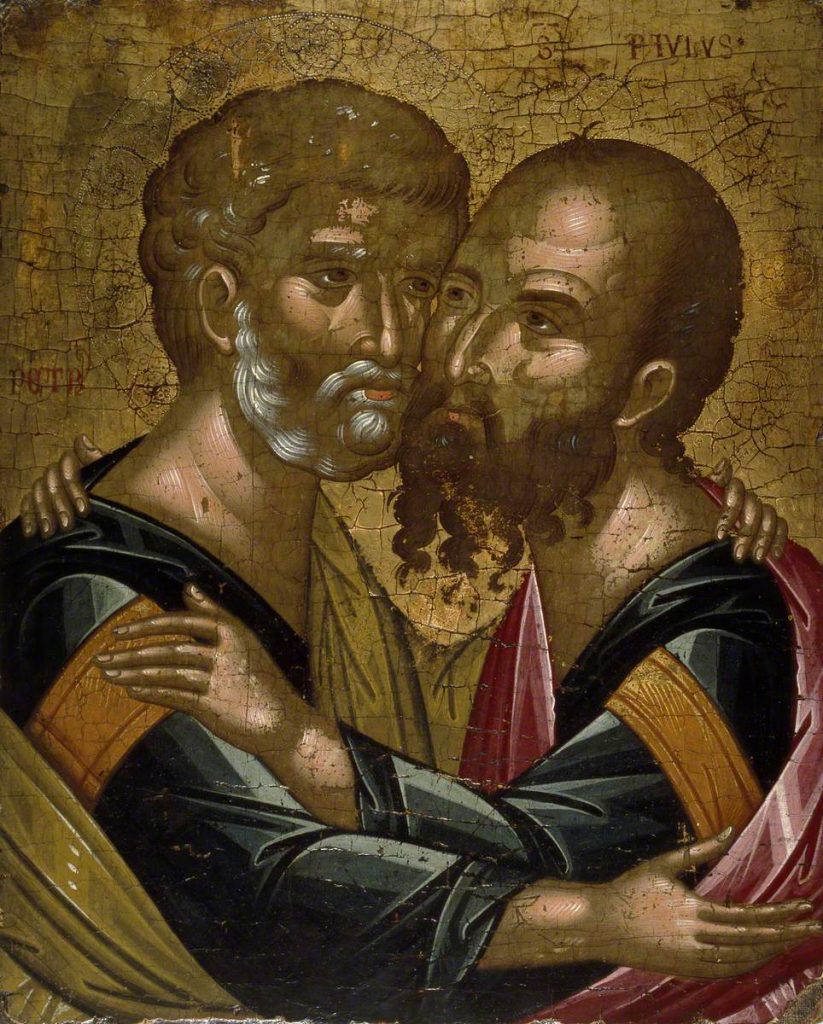
In doing God’s work, they paid the ultimate price – Ap.Peter, by being crucified upside down because he felt unworthy of replicating Christ’s death, and Ap.Paul, being a Roman citizen and therefore exempt from crucifixion, by beheading. Both events took place in Rome during Nero’s barbaric persecution of Christians.
Apostle Peter was an unaffected fisherman with a fiery yet appealing character, and was the elder brother of Saint Andrew the First-Called. Being an unpretentious and God-fearing man, he responded immediately to Christ’s summons by leaving his fishing nets and following Him. Because of his unbounded devotion, Christ distinguished him from the rest through the following: being witness to Christ’s Divine glory through His Transfiguration on Mount Tabor; beholding His Divine power through the resurrection of Jairus’ daughter, and walking on water through Christ’s consent. His house was also visited by Christ, where He cured Peter’s mother-in-law of her infirmity.
While he lost his identity as an Apostle through his three repudiations of Christ, his subsequent contrition – repeated three times – sees his restoration as one of the twelve, when Christ tells him: “Tend My sheep”. (John 21:15-17”).
Christ selected him right at the beginning of His mission on earth by re-naming him from Simon to Peter. He did this because Peter was the first to acknowledge Him as the true Messiah, after Christ asked: “But who do you say that I am?” to which he replied: “You are the Christ, the Son of the living God” (Mat. 16:15-16).
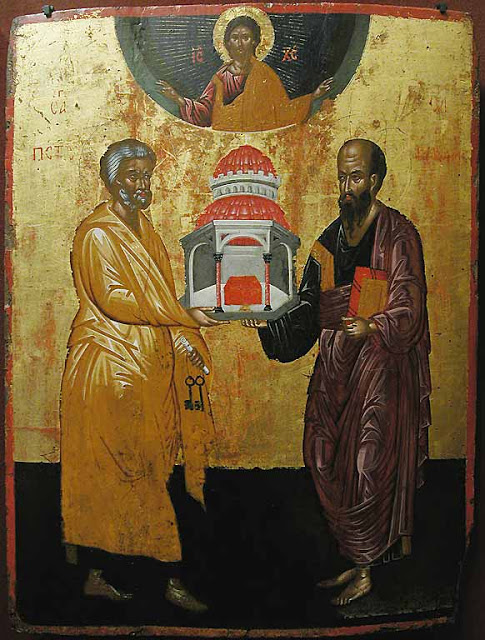
This confession of faith became the cornerstone of Christianity and earned Peter his new name, which comes from the Greek word “petros” meaning “rock”. Although he faltered at a later date by renouncing Christ three times, he was the only one, save St John, not to flee when Christ was arrested, while his ensuing penitent recovery washed him clean and his crucifixion imprinted his faith upon the whole of the Christian world.
At Pentecost, the power of his faith expressed through his homily saw thousands converted to Christianity. Quite often, his sermons were followed by miracles, giving them potency in word and deed. There were many occasions where his mere passing shadow falling on the dead, resurrected them. Endowed with such miracle-working powers, he was regarded by the other Apostles as having primacy of honour and not, as taught by the Roman Church – preeminence in authority.
When controversies arose concerning the Faith, they were submitted to a council: “Now the Apostles and elders came together to consider this matter” (Acts 15:6), which didn’t regard him senior to any other Apostle. Furthermore, he was chastised and corrected by Apostle Paul for his behaviour regarding circumcision. This event also shows that no individual apostle, bishop or patriarch is infallible – even when he speaks officially (ex officio), and he can be corrected if he is wrong.
On the other hand, Ap. Paul was not one of the original 12 Apostles or indeed, of the 70 Apostles. He never accompanied Christ in His travels but became His disciple after Ascension. Before his conversion, his name was Saul and he came into prominence by being a merciless persecutor of Christians. Through the grace of God, Saul became Paul and as he himself states: “But by the grace of God, I am what I am”. Indeed, only God’s merciful grace could have brought about such a change of heart in Saul from being a bitter enemy of Christ to His most fervent champion, who went on to spread the Word with unmatched effectiveness. As Paul declares: “I laboured more abundantly than they all” (1 Cor, 15:10).
Born into the Jewish tribe of Benjamin in the city of Tarsus, his family received the high honour of Roman citizenship. Endowed with exceptional abilities, Ap.Paul received an outstanding education under the tutorship of the famous Jewish Pharisee Gamaliel, and was not only perfectly conversant with all the books of the Old Testament, but with the ancient Greek heathen writers. Imbued with a Pharisaic hatred of Christians, he applied it with concentrated zeal (Acts 8:3) and is first mentioned in the Gospel (Acts 7:58) as a participant of the stoning of Archdeacon Stephan – the first Christian martyr.
However, the Divine Will intervened as he was travelling to Damascus on one of his pursuits of Christians, and by making him temporarily blind physically, opened his eyes spiritually. From that point on, he concentrated all his energies and abilities in bringing the Word of God to the heathens that were steeped in sinful darkness. His life became one of continuous travel through Asia Minor, Greece and Rome where he was eventually executed.
During his life, he wrote 14 Epistles that form part of the Holy Scripture. They are an irrefutable testimony of his apostolic zeal and of being an outstanding font of Christian enlightenment. His holy remains reside in Rome.
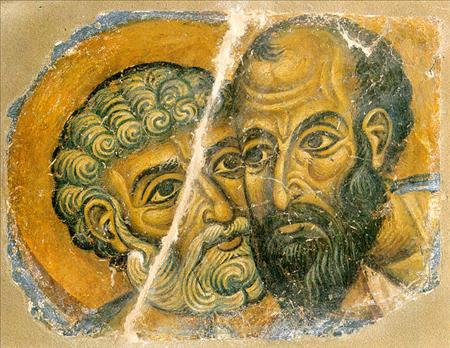
The lives of both Apostles Peter and Paul are shining examples of the frailty and imprudence of human nature when it relies on its own strength and acts independently without God’s support. Without God’s grace, Peter repeatedly displays acts of impulsiveness, inadequacy and weakness: whereas with grace he is resolute, unshakeable and fervent. Despite his innate strength, abilities and brilliant scholarship, Paul is incapable of seeing the truth. As soon as God’s grace descended upon him, he realizes his blindness, the insufficiency of human wisdom, embraces the true spiritual light of truth and through altruism becomes the greatest exponent of Christ’s Teachings. He became spiritually transfigured by embracing selflessness and plunging himself into a tireless life of passionately spreading Christ’s Truth throughout the known world. As he declares in his Epistle to the Philippians: “I can do all things through Christ who strengthens me” (4:13).
In both these great Apostles we see that by themselves, natural potency and innate abilities are quite frail, but when they are supported by God’s grace, are capable of producing astounding feats in both word and deed. Because we are all imperfect human beings – as with Apostles Peter and Paul – our strength lies in God’s grace that is within all of us, which becomes effectual only through personal exertion, through our deeds and our acts of contrition. While God’s grace is in force within us, it’s not active without our participation and our efforts. It doesn’t force itself upon us against our free will, but rather inclines and directs our will toward goodness and Christian acts.
Another valuable lesson to be seen in their lives is that of the many tribulations, deprivations and suffering they experienced amid their lives.
Throughout his travels, Saint Peter was imprisoned three times, subjected to abuse and beatings, finally ending his life cruelly martyred upside down on a cross. Meanwhile Saint Paul, having sustained physical assaults was constantly covered with lacerations and injuries through being: given 39 lashes on 5 occasions by the Jews, beaten with sticks in 3 instances and stoned at another time. During his travels he suffered 3 shipwrecks, was in danger from bandits, fellow tribesman, heathens, in cities, in the deserts, on the seas and false brethren (2 Cor. 11:23-27). In both these great Apostles, Christ’s words were realised in full measure: “In the world, you will have tribulation” (John 16:33).
Through all their ordeals and deprivations, they never called upon Christ to relieve them of their pain and severity. Instead, Apostle Paul sums up their feelings: “I consider that the sufferings of this present time are not worthy to be compared with the glory which shall be revealed in us” (Rom. 8:18). In other words, if suffering on earth is accepted and endured in a Christian way, the glory and joy that awaits us in Heaven for our fidelity is beyond measure, because our perfection requires a growth that is manifested only in suffering.
As Saint Ephraim of Syria declares: “If it is possible to receive the Kingdom of Heaven without sorrows, without temptations, without various submissive acts of goodness, then why did God allow the Saints to endure such dangers, temptations and repressions, and didn’t allow them to live willfully and extravagantly? Consequently, let us not lose heart when we experience some grief or affliction but instead, begin to rejoice that we are following the path of Saints”.
May these great Apostles Peter and Paul pray for us before Christ so that we too may spread His Teachings in this dark hour of apostasy.
Amen

